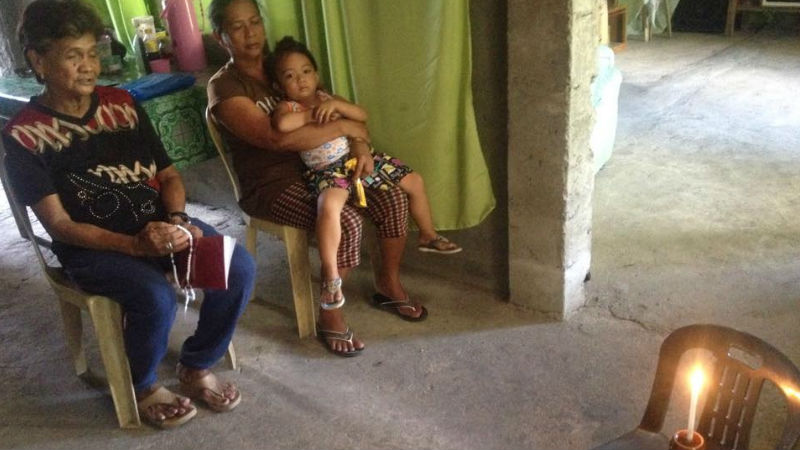
Nenita Castro (at left) leads the “Nangangaluluwa” of Barangay Balubad in Bulakan, Bulacan. She is shown here with a Bulacan family who haf asked her to join a 9-day novena for their late mother on oct. 28. Photo by Carmela Reyes-Estrope @careyestropeINQ
BULAKAN, Bulacan—Ten women from Balubad village here are knocking on doors today, the eve of All Saints Day, to share their songs for the dead.
The practice may seem odd to a young generation, which may mistake the women for very, very early carolers, said Nenita Castro, 71, who walked from house to house with her group for the traditional “Pangangaluluwa.”
“One may say this is caroling for the souls of the dead,” said Castro, who learned the craft from her mother.
According to Castro, the four songs her group brings from house to house are prayers for the dead, which are performed to make the departed’s transition to heaven easier.
Once all the songs are performed, the household offers the singers, or “nangangaluluwa,” a donation, which Castro and her group will later hand over to the church or chapels in their respective neighborhoods.
The verses, in Latin and in Filipino, are sang from memory.
Castro said she went through constant drills with her mother to internalize these songs, because her sisters declined to take up the task.
The 10 nangangaluluwa of Balubad perform for families in the Bulakan villages of Balubad, Maysantol (Cupang), Tibig, Sta. Ana, Sta. Ines, and Pitpitan.
Castro said her group had also been invited to sing in Bulacan towns, like Marilao and Sta. Maria and in Malolos City.
Pangangaluluwa used to be undertaken from Oct. 30 to Nov. 1, when it was introduced during the Spanish colonial period, said Jaime Corpuz, a Bulacan historian and published author.
The days running up to Nov. 1 are always the busiest for Castro’s group because of its vast knowledge about prayers for the dead.
On Friday, they were invited to the house of Isabel San Pedro in Barangay Tibig.
San Pedro’s mother, Consuelo Bernardino, passed away on Oct. 7, 2015, and Castro’s group was asked to join the nine-day novena being conducted for Consuelo.
“It’s been the family’s practice to pray for the soul of our loved ones. My mother asked us before she died to continue praying for her soul,” San Pedro said.
On the same day, Castro was invited by an old woman in a farm to help cast away bad spirits that have been bothering her.
Castro said her group recited Latin and Tagalog prayers designed to chase away malignant spirits.
She said remembering the dead was a time-honored Filipino tradition that would not go away, which was why future generations would continue singing to their dead.